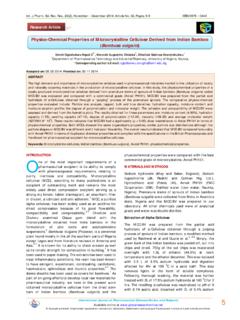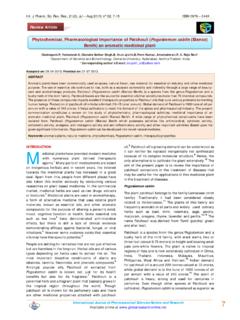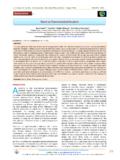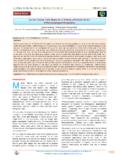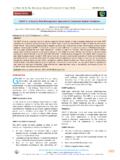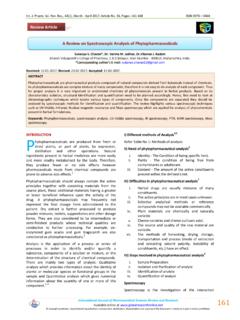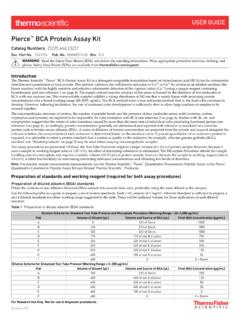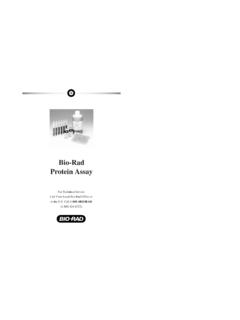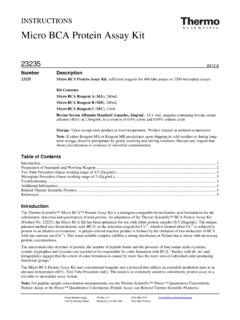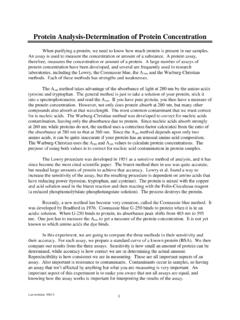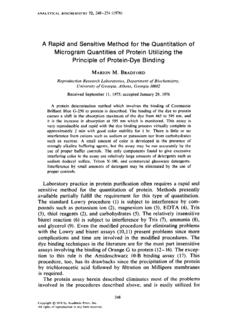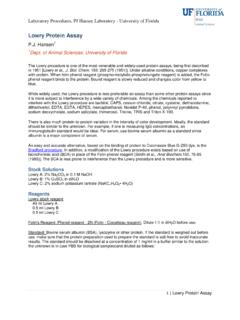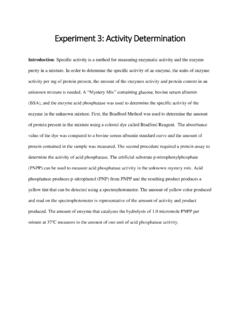Transcription of Research Article the Bovine Serum Albumin Protein ...
1 Int. J. Pharm. Sci. Rev. Res., 47(1), November - December 2017; Article No. 27, Pages: 145-153 ISSN 0976 044X International Journal of Pharmaceutical Sciences Review and Research . International Journal of Pharmaceutical Sciences Review and Research Available online at Copyright protected. Unauthorised republication, reproduction, distribution, dissemination and copying of this document in whole or in part is strictly prohibited.. Available online at 145 Yvonne A. Bailey-Shaw*1, Lawrence A. D. Williams1,2, Cheryl E. Green1, Shawntae Rodney1, Ann Marie Smith1 1 Scientific Research Council, Product Research and Development Division, Hope Gardens Complex, Kingston 6, Jamaica West Indies.
2 2 University of Technology, College of Health Sciences, 237 Old Hope Road, Kingston 6, Jamaica West Indies. *Corresponding author s E-mail: Received: 18-10-2017; Revised: 05-11-2017; Accepted: 18-11-2017. ABSTRACT Jamaica has a rich biodiversity, with high plant endemism. Indications are that a significant number of local plants are used in the treatment of various illnesses, including inflammatory conditions. Denaturation of proteins is one of the well documented causes of inflammation. This study seeks to evaluate the in vitro anti-inflammatory potential of the ethanolic leaf extracts of selected Jamaican plants. Ninety-nine (99) Jamaican plants were screened.
3 Ethanolic extracts of their leaves were prepared by maceration. These were evaluated in vitro at concentrations of g/mL, g/mL and g/mL using the Bovine Serum Albumin (BSA) Protein denaturation assay . Five of the most active crude extracts identified, were then column fractionated using solvent mixtures of ethyl acetate in hexane of increasing polarities. The collected fractions were pooled, based on their thin layer chromatography (TLC) profiles and further assayed, in order to determine the most active fractions. Aspirin was used as the reference anti-inflammatory drug. Crude extracts of Cajanus cajan, Cinnamomum zeylanicum, Cordia alba, Mangifera indica and Tecoma stans, significantly inhibited the denaturation of BSA exhibiting anti-denaturation activity of , , , and respectively, in comparison to aspirin ( ).
4 Column fractionation of these crude extracts, resulted in increased inhibition of denaturation of BSA in fractions 5 ( g/mL), 16 ( g/mL, g/mL) and 12 ( g/mL) of C. zeylanicum, T. stans and M. indica respectively. However, complete loss of activity was observed in fractions of C. cajan and C. alba. The ethanolic extracts of C. cajan, C. Zeylanicum, C. alba, M. indica and T. stans possess significant anti-inflammatory activity. However, further investigations of fractions of C. zeylanicum, T. stans and M. indica, will be necessary for isolation of potential lead anti-inflammatory compounds. Crude ethanolic leaf extracts of C. cajan and C.
5 Alba, may be more efficacious than isolated compounds. Keywords: Anti-inflammatory potential, BSA assay , Cajanus cajan, Cinnamomum zeylanicum, Cordia alba, Mangifera indica, Tecoma stans. INTRODUCTION rotein denaturation has been identified as the cause of inflammation. Indications are that when living tissues are injured, inflammation results. This is characterized by redness, pain, heat, swelling, as well as loss of function in the affected area. Disruption of the electrostatic, hydrogen, hydrophobic and disulphide bonds in the Protein structure occurs. In addition, a complex array of enzyme activation, mediator release, cell migration, tissue breakdown and repair, occur, causing the Protein to lose its molecular conformation and functions or become denatured.
6 1-4 It is therefore deduced that, compounds which are able to prevent these changes and inhibit thermally or heat induced Protein denaturation, have potential therapeutic value as anti-inflammatory agents. 3 Steroidal and non-steroidal anti-inflammatory drugs (NSAIDs) are commonly used for the management of inflammatory conditions such as rheumatoid arthritis and other infectious diseases. They reportedly bind to plasma Albumin , preventing or inhibiting the thermal denaturation of Albumin . However, they often have toxic or secondary adverse effects resulting from prolonged use which cause damage to the liver, gastrointestinal tract as well as cardiovascular and renal , 5-7 The need therefore exists, to explore alternative sources of anti-inflammatory drugs from plant origins.
7 The perceived efficacy, low incidence of serious side effects or relative safety, compared to the synthetic alternatives, as well as the affordability of plant-derived drugs make this search worthwhile. In addition, the ethno-pharmacological uses of many medicinal plants extensively as crude extracts or as pure compounds, have generated considerable interest as it relates to the treatment of various medical conditions including chronic inflammatory diseases. With more than 80 % of the world s population currently relying on plant-derived medicines for their primary healthcare needs, screening of these plants for potential anti-inflammatory compounds could be a step toward the discovery of safer and more effective , 8-10 Williams et al.
8 ,11 proposed the stabilization of heat treated BSA by NSAIDs as an assay for replacing animals in the early stages of screening for non-steroidal anti-inflammatory drugs. Several Research groups have since used the assay for validating compounds that could be of pharmaceutical , 12 The folk medicinal literature of Jamaica indicates that several plants are used in the treatment of However, the scientific evidence is lacking. Ninety-nine Jamaican medicinal plants were therefore selected and the ethanolic leaf extracts screened for their stabilization effects on BSA using the in vitro BSA Protein denaturation Subsequently, In-Vitro Evaluation of the Anti-Inflammatory Potential of Selected Jamaican Plant Extracts using the Bovine Serum Albumin Protein Denaturation assay .
9 P Research Article Int. J. Pharm. Sci. Rev. Res., 47(1), November - December 2017; Article No. 27, Pages: 145-153 ISSN 0976 044X International Journal of Pharmaceutical Sciences Review and Research . International Journal of Pharmaceutical Sciences Review and Research Available online at Copyright protected. Unauthorised republication, reproduction, distribution, dissemination and copying of this document in whole or in part is strictly prohibited.. Available online at 146 the five most active extracts were chosen and further separated by column chromatography for the possible isolation of lead anti-inflammatory compounds.
10 MATERIALS AND METHODS Preparation of Crude Leaf Extracts Leaves of ninety-nine (99) plants were collected from various locations across the island. They were taxonomically identified at the Department of Life Sciences Herbarium (University of the West Indies, Mona, Jamaica). Samples were air dried under laboratory conditions (25 27 o C and 70 80 % Relative Humidity) for five days and then milled into a coarse powder. Ten grams (10 g) of dried powder of each plant was extracted with 95 % ethanol (200 mL) for five days. The resulting extracts were filtered and concentrated to oily residues in vacuo using a rotary evaporator (B CHI Rotovapor R-200) and then stored at 4 o C until required.

